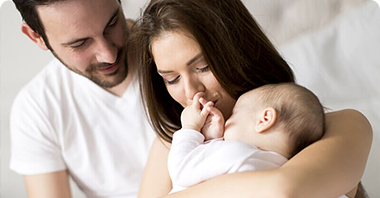

A new born baby is a bundle of joy and brings a lot of excitement to his/her parents. Along with the excitement and joy he/she presents a lot of challenges, more so for a couple who become parents for the first time. The newborn period provides opportunities for the parents to establish a life time bond with the little one and also learn about the entrant into their family. Every parent will realize that no amount of preparedness during pregnancy and before the baby’s birth would be sufficient to handle their baby in the initial days. Understanding and preempting the baby’s needs will always remain a work in progress. As if these are not enough, every parent needs to redesign his/her life to accommodate the newborn baby, the tiring baby care schedule and get adequate rest. Every mother needs to learn to feed her baby, comfort him/her apart from enjoying the moment. Similarly every newborn baby has his/her own set of goals and challenges – learning to feed, getting adjusted to a different environment, adapt to excessive stimulation and disturbances. To achieve all of these, it is important the baby gets physical touch of the mother as much as possible in the form of holding, breast feeding and spend as much as time with the newborn baby. Crying is the only form communication a little baby does. In the first few weeks of life, crying has to be treated as sign of hunger and the baby has to be breast feed. Every feeding attempt may not translate into satiety, but it is necessary to attempt breast feeding in order to enable the baby learn feeding and improve lactation of the mother. More often than not, a successful feed is followed by a calm sleep for a period of 2-3 hours. It is mandatory to burp the baby immediately after feeding, to get rid of the air swallowed during feeding. Burping may be done either by gentle patting on the baby’s back while holding him/her on mother’s chest with chin resting on shoulder or by gentle pat on the baby’s back in sitting position with chest as well as chin supported by the mother. Spitting a little part of feed is not uncommon in newborns. Hiccups, sneezing, nasal discharge, occasional fast breathing may be noticed in babies. The adequacy of the feed is often ascertained by the weight gain of the baby every day, less crying post feeding and frequency of urine output (atleast 6-8 times a day after the first two days). Formula feeds despite shortcomings may be substituted in cases of inadequacy of breast milk. A newborn baby may pass stools with every feed or even once in 4-5 days. Often babies pass 6 -10 times a day. Stool colour may vary from greenish black (in the first two days) to green (2-4 days) to yellow. Frequent changes of diaper may cause rashes which need to be addressed. Newborn babies cannot regulate their body temperatures like grown up adults and hence require to be kept warm by wrapping with an extra layer of clothing. Babies tend to sleep for most part of the day initially and have to learn to sleep in nights. In the initial few weeks babies often stay active in nights and sleep in the day time. It may usually take few weeks for the babies to adjust to concept of sleeping in nights. The umbilical cord stump typically falls off within one to two weeks after birth. Till it naturally falls, it is preferable to keep the area dry. Bathing of the baby may be done once the chord stump falls. Newborn babies tend to have dry skin as well as skin peeling. Oil massage and skin moisturizers can be used on a daily basis. Apart from hunger, baby’s cry is usually associated with wet diaper due to stool or urine. An inconsolable cry has to be associated to illness of the baby such as colic, constipation. Other warning signs that are associated with illness of the baby are poor activity, refusal to feed or poor feeding, poor weight gain and decreased frequency of urine. Fever in newborns is associated with dehydration. As young parent, it is not uncommon to get panicked at various normal events like baby spitting the feed, vomiting, frequent passage of stools or passing stools once in few days. The fact is that these are nothing abnormal. Since crying is the only form of communication the baby does, it is alright to let the baby cry. It is worthwhile having more members in form of family, friends for emotional and psychological support. Physical and emotional stress have bearing on the lactation and hence it is imperative that the mother finds adequate sleep – more often when the baby sleeps. A healthy diet comprising of nutrients is a must for lactating mother. At times it is wiser not to take too many advices which is usually plenty.